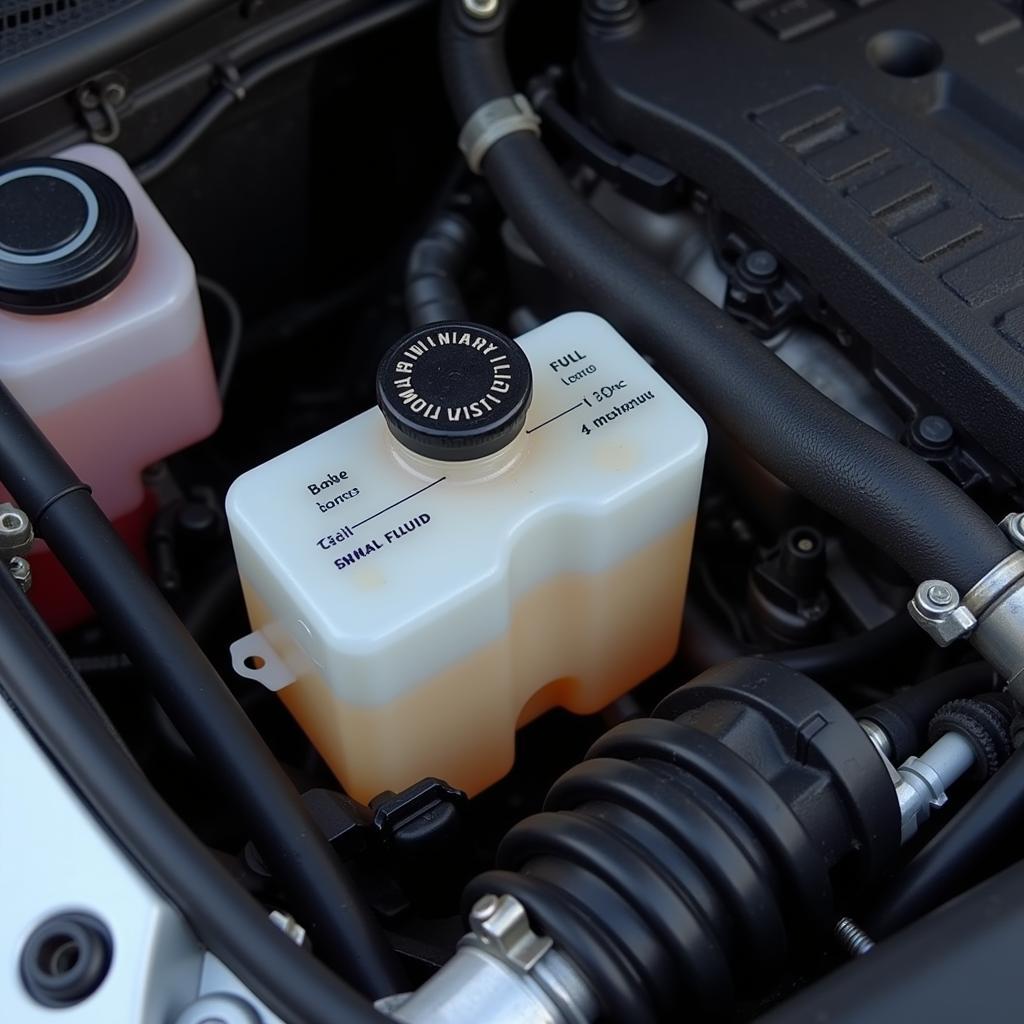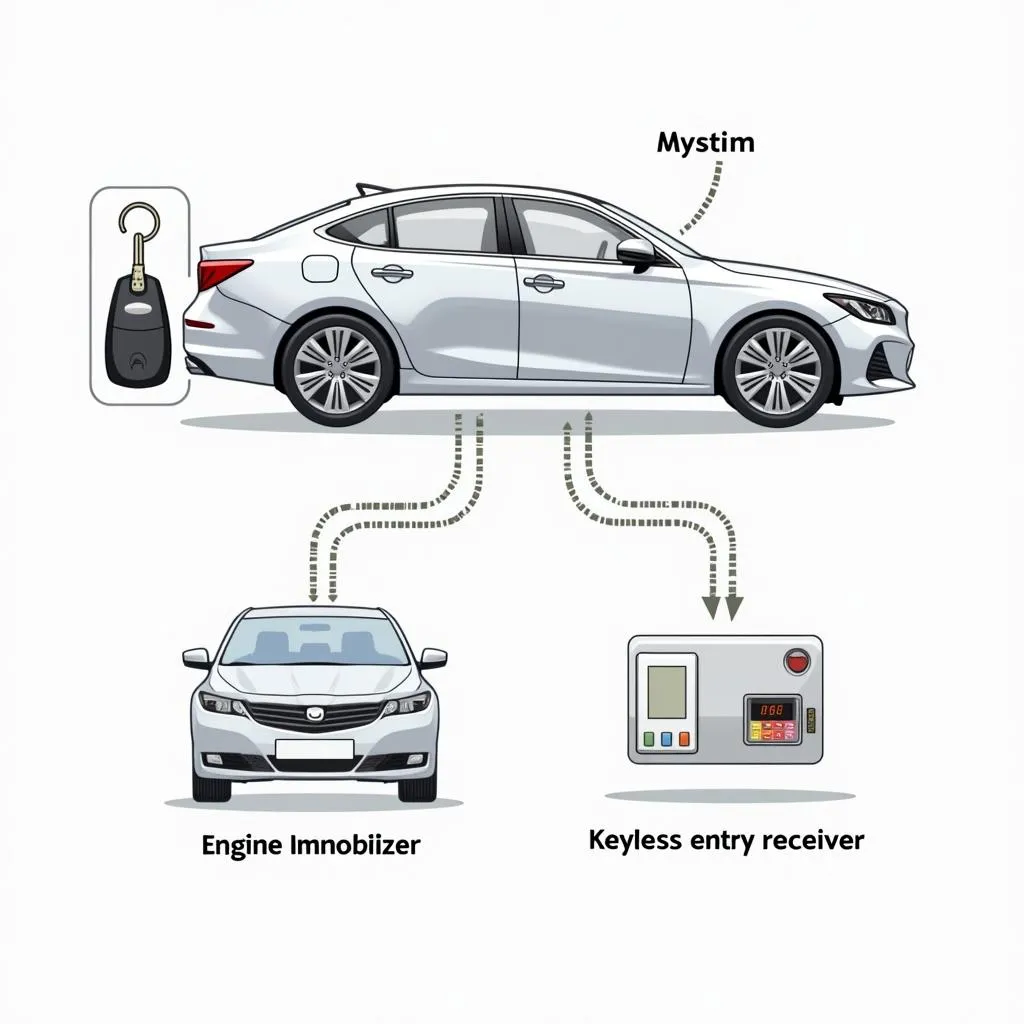The ABS brake warning light on your Audi A3 dashboard is a critical safety feature. When illuminated, it signals a potential problem with your Anti-lock Braking System (ABS). This system prevents wheel lockup during sudden braking, helping you maintain steering control and avoid collisions. Ignoring this warning light can compromise your safety and potentially lead to more extensive and costly repairs.
This comprehensive guide will delve into the common causes of the Audi A3 ABS brake warning light and provide you with potential solutions, empowering you to address this issue effectively.
Understanding the Audi A3 ABS System
Before we dive into the causes and solutions, let’s briefly understand how the ABS system in your Audi A3 works:
- Wheel Speed Sensors: Your A3 has a sensor at each wheel that constantly monitors its speed.
- ABS Control Module: This electronic module receives data from the wheel speed sensors.
- Hydraulic Control Unit: This unit regulates the brake fluid pressure to each wheel.
When you brake abruptly, the ABS system springs into action. If the control module detects a wheel locking up (rotating significantly slower than others), it signals the hydraulic unit to rapidly adjust the brake pressure to that specific wheel, preventing it from skidding.
Common Causes of the Audi A3 ABS Brake Warning Light
Here are the most frequent culprits behind the ABS brake warning light illuminating on your Audi A3’s dashboard:
1. Faulty Wheel Speed Sensors
The most common culprit is often a malfunctioning wheel speed sensor. These sensors are susceptible to damage from:
- Road Debris: Stones, dirt, and debris can impact and damage the sensors.
- Corrosion: Exposure to moisture and road salt can lead to sensor corrosion.
- Wiring Issues: Damaged or frayed wiring connecting the sensors can disrupt the signal.
2. ABS Control Module Issues
The ABS control module, the brain of the system, can also experience problems:
- Electrical Malfunctions: Power surges, shorts, or loose connections can affect the module.
- Software Glitches: Infrequent, but possible, software errors within the module might require reprogramming.
3. Hydraulic Control Unit Problems
Issues with the hydraulic control unit, responsible for regulating brake fluid pressure, are less common but can still occur:
- Internal Valve Failure: Wear and tear can cause the internal valves to fail, affecting pressure distribution.
- Fluid Leaks: Leaks in the hydraulic system can disrupt proper pressure and trigger the warning light.
4. Low Brake Fluid Level
One of the simplest but crucial factors to check is your brake fluid level. Low brake fluid indicates a leak or worn brake pads, potentially affecting your ABS system.
 Checking Audi A3 Brake Fluid Level
Checking Audi A3 Brake Fluid Level
5. Blown Fuse
A blown fuse in the ABS system’s electrical circuit can also trigger the warning light. This is usually a straightforward fix, requiring a simple fuse replacement.
Diagnosing the Problem
Accurately diagnosing the root cause of the ABS brake warning light requires specialized diagnostic equipment.
What to Expect at a Diagnostic Session:
- Scanning for Trouble Codes: A qualified mechanic will connect a diagnostic scanner to your A3’s onboard computer to retrieve specific trouble codes stored within the system. These codes provide valuable clues about the nature of the ABS problem.
- Inspecting Components: Depending on the trouble codes, the mechanic will visually inspect relevant components like wheel speed sensors, wiring harnesses, and connections for signs of damage, corrosion, or wear.
- Testing Components: Further testing of suspected components might be necessary to confirm their functionality and pinpoint the faulty element.
Potential Solutions and Repair Options
The solution for your Audi A3 ABS brake warning light depends entirely on the underlying cause. Here are some common repair options:
- Replacing Faulty Wheel Speed Sensors: If a wheel speed sensor is identified as faulty, replacement is usually the most effective solution.
- Repairing or Replacing Wiring: Damaged or frayed wiring will need repair or replacement to ensure a proper signal from the sensors.
- Reconditioning or Replacing the ABS Control Module: Depending on the module’s specific problem, it might be possible to recondition it. However, replacement might be necessary in some cases.
- Addressing Hydraulic Control Unit Issues: Problems within the hydraulic unit might involve repairing internal components or replacing the entire unit.
- Refilling Brake Fluid: If low brake fluid is detected, the mechanic will refill it and inspect the system for leaks.
- Replacing a Blown Fuse: A blown fuse requires a simple replacement with a new one of the correct amperage.
Is It Safe to Drive with the ABS Light On?
While you might still have regular braking functionality, driving with the ABS brake warning light on is strongly discouraged.
Here’s Why:
- Loss of ABS Functionality: The illuminated warning light indicates a problem with your ABS. If the system fails entirely while driving, your wheels could lock up during hard braking, increasing the risk of an accident.
- Potential for Further Damage: Continuing to drive with an unresolved ABS issue could exacerbate the problem and potentially lead to more costly repairs.
Recommended Course of Action:
- Schedule an Inspection: As soon as the ABS brake warning light illuminates, it’s crucial to schedule an inspection with a qualified mechanic specializing in Audi vehicles as soon as possible.
- Minimize Driving: If you must drive, do so with extra caution, especially in wet or slippery conditions. Maintain a safe distance from other vehicles and be prepared to brake earlier than usual.
Preventive Measures to Avoid Future Issues
While not all ABS problems are preventable, some proactive measures can help you maintain a healthy ABS system in your Audi A3:
- Regular Brake Inspections: Adhere to your Audi A3’s recommended brake inspection schedule. Regular inspections allow mechanics to detect potential issues early on, including those related to your ABS.
- Quality Brake Fluid: Use high-quality brake fluid and ensure it’s replaced at the recommended intervals. This helps prevent corrosion within the system.
- Careful Driving Habits: Avoid harsh braking whenever possible. While your ABS is designed to handle emergency braking, consistent harsh braking can put extra strain on the system.
Conclusion
The ABS brake warning light in your Audi A3 is a crucial safety indicator. Addressing the problem promptly is essential to ensure your safety on the road. By understanding the common causes, familiarizing yourself with the diagnostic process, and proactively addressing any issues, you can keep your Audi A3’s ABS system in optimal condition, ensuring a safe and controlled driving experience. Remember, when it comes to safety, never ignore a warning light.
FAQs about Audi A3 ABS Brake Warning Lights
1. Can I check the ABS system myself?
While you can visually inspect some components like brake fluid levels and connections, a proper diagnosis requires specialized equipment and expertise. It’s best to leave this to a qualified Audi mechanic.
2. How much does it cost to fix an ABS problem in an Audi A3?
The cost varies widely depending on the specific issue, the cost of parts, and labor rates in your area.
3. Can I still drive my Audi A3 if the ABS light is flashing?
A flashing ABS light usually indicates a more severe issue with your braking system. It’s crucial to stop driving immediately and have your vehicle towed to a mechanic for inspection.
4. Is the ABS light related to the brake pad warning light?
While both are related to your braking system, they indicate different issues. The brake pad warning light illuminates when your brake pads are worn and require replacement.
5. How long can I drive with the ABS light on?
You should never intentionally drive with the ABS light on. Schedule an inspection and minimize driving to avoid potential hazards.
6. Can a faulty battery cause the ABS light to come on?
Yes, a weak or faulty battery can sometimes disrupt the electrical signals within the ABS system, potentially triggering the warning light.
7. Can driving through deep water affect the ABS system?
Yes, driving through deep water can potentially damage the ABS wheel speed sensors or other electrical components, leading to malfunctions.

